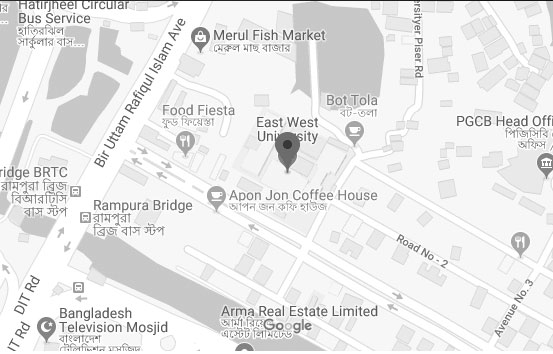The Department of Civil Engineering (DCE) at East West University starts its journey in 2017. The department offers four-year Bachelor of Science (B.Sc.) degree program in Civil Engineering (CE) with an ambition of developing competent work force for the continuous demands in this sector at both home and abroad. The curriculum of the degree is prepared with the intension to groom up the students to effectively contribute in all aspects of Civil Engineering. Therefore, the curriculum of the B.Sc. in Civil Engineering (CE) program focuses on (i) Structural Engineering, which involves the design of structures (Buildings, bridges, flyover, tunnel, tower, retaining walls, etc.) that should be safe for the users, be economical, and accomplish the desired functions. (ii) Geotechnical Engineering, which deals with soils, rocks, foundations of buildings and bridges, highways, sewers and underground water systems. (iii) Water Resources Engineering that concerns the management of quantity and quality of water in the underground and above ground water resources, such as rivers, lakes and streams. Geographical areas are analyzed to forecast the amount of water that will flow into and out of a water source. Fields of hydrology, geology, and environmental science are included in this discipline of Civil Engineering, (iv) Environmental Engineering, which is related to the science of waste management of all types, purification of water, cleaning of contaminated areas, reduction of pollution, and industrial ecology and (v) Transportation Engineering, where technology and scientific principles are applied to the planning, functional design, operation and management of facilities for any mode of transportation in order to provide for the safe, efficient, rapid, comfortable, convenient, economical, and environmentally compatible movement of people and goods.
Now-a-days, Civil Engineers have to be more interactive with the society and they must possess a very broad skill set, from cost accounting to geology as well. Many Civil Engineering works require a very hands-on role in construction, while others may demand more heavily weighted toward supervisory and administrative skills. Civil Engineers are often called upon to present reports to the public or government officials. Whatever the details of their role, Civil Engineers must often manage very complex projects, leading many to specialize in one of several areas. Therefore, along with the technical skills the other required skills are skills of visualization and critical thinking, management and leadership skill, and excellent communication skill. The curriculum and the teaching-learning methodology of the undergraduate program has been designed such a fashion that along with the technical skills, they will also acquire other important skills such as critical thinking, management, leadership and excellent communication skill.


